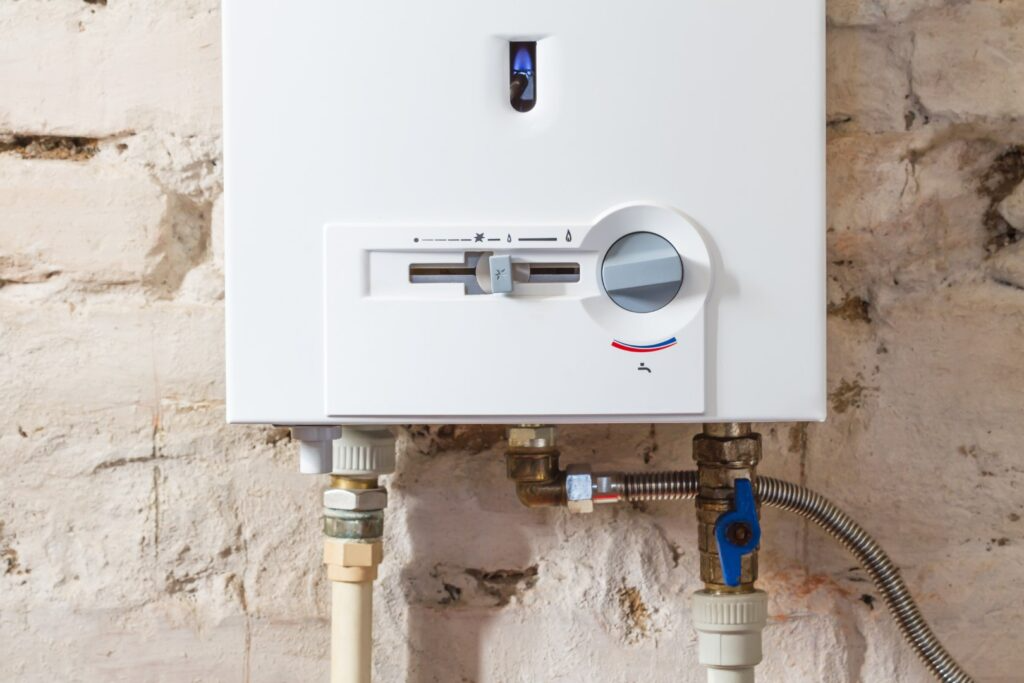With all the different types of water heaters available, choosing the right type is essential to ensure comfort and efficiency in your home.
Whether you are in the market for a new water heater or doing research on your current equipment, there is value in learning the ins and outs of this essential system. It’s also important to learn how to protect yourself against costly repairs and replacements if something goes wrong with your water heater.
Did you know home warranties cover water heaters? Learn more about what a home warranty covers , or get your free quote below.
Table of Contents
What are the different types of water heating systems?
When it comes to water heating systems, there are several options available to homeowners. The most common types include storage tanks, tankless, electric, gas, heat pumps, hybrid, condensing, and solar water heaters.
Storage Tank Water Heaters
A traditional tank water heater is a popular choice in many homes. These units store 30 to 100 gallons of water. A built-in sensor keeps the water heated, turning the heat on as needed.
Benefits
-
- High capacity: Meets the needs of big families.
- Convenient: Hot water is always ready to use.
- Affordable: Lower initial cost compared to tankless systems.
- Energy efficiency: New models reduce energy consumption.
- Easy installation: Quick setup without major plumbing changes.
- Reliable: Proven to last for years.
Tankless Water Heaters
Also known as on-demand water heaters, these provide hot water instantly without the need for a storage tank, reducing energy waste. Though pricier upfront, they’re more efficient and durable. Gas heaters are the best option, while electric units might require costly electrical upgrades.
Benefits
-
- Energy efficient: Heats water only when needed, saving energy.
- Space saving: Compact design fits smaller spaces.
- Endless hot water: It never runs out of hot water.
- Longer lifespan: Lasts up to 20 years.
- Reduced water damage: No tank to leak or rupture.
- Eco-friendly: Uses less energy, lowering carbon footprint.
Electric Water Heaters
Electric water heaters offer efficient heating by transferring heat from the air, cutting energy costs. They’re a smart, durable option for homeowners wanting to save in the long run.
Benefits
-
- Energy efficient: Uses less energy than standard heaters.
- Fast heating: Keeps up with heavy water usage.
- Long-lasting: Typically lasts over 15 years.
- Compact: Ideal for homes with limited space.
- Eco-conscious: Reduces environmental impact.
- Cost-effective: High initial cost but saves money over time.
Gas Water Heaters
Gas water heaters, one of the most common types of water heaters, use natural gas or propane to heat water efficiently and quickly.
Benefits
-
- Quick heating: Heats water faster than most electric models.
- Reliable performance: Provides consistent hot water supply.
- Lower operational costs: Often cheaper to run than electric models.
- Works in power outages: Operates even during power outages.
Heat Pump Water Heaters
Heat pump water heaters extract heat from the air or ground and transfer it to the water, making them highly energy-efficient.
Benefits
-
- Energy-saving: Uses up to 60% less energy than traditional heaters.
- Environmentally friendly: Reduces carbon footprint.
- Long lifespan: Durable, with a lifespan of 10–15 years.
Hybrid Water Heaters
Hybrid water heaters use a heat pump to draw heat from the air and ground, making them highly energy-efficient compared to conventional models.
Benefits
-
- Energy savings: Uses up to 60% less power than tank heaters.
- Eco-friendly: Reduces energy consumption significantly.
- Durable: Lasts longer than traditional tank water heaters.
Condensing water heaters
Condensing water heaters use gas efficiently, recycling heat from exhaust gases to warm water. Ideal for large homes, they cut energy costs.
Benefits
-
- High efficiency: 90-98% energy efficiency means big savings.
- Quick hot water: Heats water faster than traditional systems.
- Durable: Built to last for many years.
- Energy savings: Significant reduction in utility bills over time.
- Boosts home value: Increases resale value with efficient appliances.
Solar power water heaters
One of the different types of water heaters, solar-powered systems, uses the sun’s energy to heat water, offering summer savings. They have backup systems for cold days but are costly upfront.
Benefits
-
- Energy savings: Cut energy bills by relying on sunlight.
- Tax credit: Claim 30% of installation costs as a tax credit.
- Lower carbon footprint: Reduce greenhouse gas emissions significantly.
- Higher property value: Increases home value with energy-efficient features.
- Durable: Lasts around 20 years with minimal maintenance.
- Cold-weather ready: Operates efficiently in cold climates as well.
What is the most efficient type of hot water heater?
Among the different types of water heaters, tankless water heaters are considered the most energy-efficient option, with a lower operating cost.
Tankless water heaters are highly efficient because they only heat water when needed, avoiding standby heat loss that occurs with storage tank water heaters. This feature helps reduce energy consumption and lower utility bills.
Tankless water heaters also have a longer lifespan compared to traditional storage tank models.
What is the downside of a tankless water heater?
Although they’re popular for their benefits, including an on-demand hot water supply and greater energy efficiency, tankless water heaters have a few drawbacks to consider.
Tankless water heaters typically have a higher upfront cost compared to storage tank water heaters. They also have certain limitations when it comes to providing hot water in larger households.
The demand for hot water from multiple appliances simultaneously may exceed the heater’s capacity, resulting in running out of hot water. Fortunately, these limitations can be effectively managed through proper sizing and careful consideration of the hot water demand.
Should I get a home warranty that covers my water heater?
The best way to protect yourself from unwanted costly repairs is to find a home warranty plan that covers your water heater.
A home warranty that covers your water heater can help offset the overall costs of repairs and replacements in case of unexpected breakdowns, as well as provide added protection to manufacturer warranties and retail protection plans.
What home warranty should I get for my water heater?
No matter which of the different types of water heaters you use at home, it’s essential to ensure you’re covered with the right protection.
As the best value in home warranties, SHW’s Gold and Platinum Care plans can cover your water heater, plus other essential systems in your home.
Learn how you can protect your home today with a FREE quote by clicking the link below or dialing 800-670-8931.

